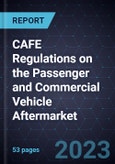Investment in R&D Needed to Deliver Fuel-efficient Technologies for Component Upgradation
Countries worldwide are on the verge of reducing their overall greenhouse gas emissions. To achieve their objectives, setting regulatory standards and targets to control emissions from vehicles plays a crucial role. Regional governments adopt Corporate Average Fuel Economy (CAFE) regulation policies/standards to reduce energy consumption, promote sustainable transportation practices, and address environmental/climate change issues.
These requirements from government agencies are often referred to as fuel economy regulation/fuel efficiency standards to limit the amount of fuel that vehicles consume per unit of distance traveled. For example, fuel consumption targets are measured in terms of liters per 100 kilometers (l/100 km) or miles per gallon (MPG) for various vehicle classes, such as passenger cars, light trucks, and heavy-duty trucks. Alongside the fuel economy standards, emission standards/policies are also drafted to drive the reduction of overall regional/global greenhouse gas emissions. The standards/policies of regions/countries often align with their environmental goals and initiatives to reduce global warming.
In this report, the publisher analyzes the implications of emission and fuel consumption regulations on the automotive aftermarket. Ongoing fuel consumption and emission regulations allow component manufacturers to develop innovative products and sustainable remanufacturing practices to not only stay compliant with regulatory requirements but also to improve their overall aftermarket revenue. Focus on electric vehicle repair and servicing and setting up exclusive workshops for emissions testing and optimization are focus areas that will drive business volume for automotive aftermarket industry stakeholders.








